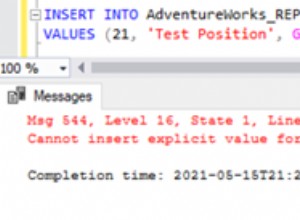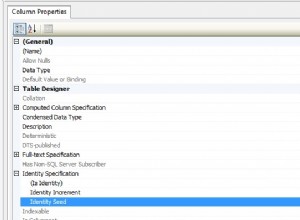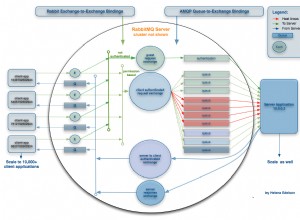Pour pouvoir sélectionner toutes les colonnes et pas seulement object_id et MAX(event_timestamp) , vous pouvez utiliser DISTINCT ON
SELECT DISTINCT ON (object_id)
object_id, event_timestamp ---, more columns
FROM test_select
ORDER BY object_id, event_timestamp DESC ;
Si vous souhaitez que les résultats soient triés par event_timestamp DESC et non par object_id , vous devez l'inclure dans une table dérivée ou un CTE :
SELECT *
FROM
( SELECT DISTINCT ON (object_id)
object_id, event_timestamp ---, more columns
FROM test_select
ORDER BY object_id, event_timestamp DESC
) AS t
ORDER BY event_timestamp DESC ;
Alternativement, vous pouvez utiliser des fonctions de fenêtre, comme ROW_NUMBER() :
WITH cte AS
( SELECT ROW_NUMBER() OVER (PARTITION BY object_id
ORDER BY event_timestamp DESC)
AS rn,
object_id, event_timestamp ---, more columns
FROM test_select
)
SELECT object_id, event_timestamp ---, more columns
FROM cte
WHERE rn = 1
ORDER BY event_timestamp DESC ;
ou agréger MAX() avec OVER :
WITH cte AS
( SELECT MAX(event_timestamp) OVER (PARTITION BY object_id)
AS max_event_timestamp,
object_id, event_timestamp ---, more columns
FROM test_select
)
SELECT object_id, event_timestamp ---, more columns
FROM cte
WHERE event_timestamp = max_event_timestamp
ORDER BY event_timestamp DESC ;




